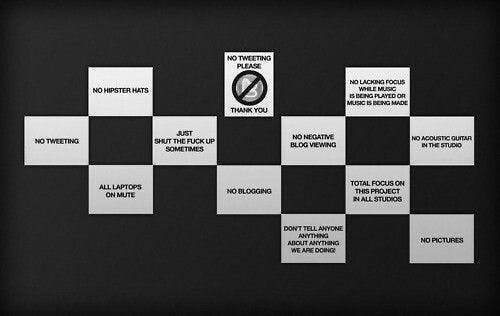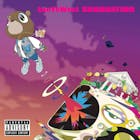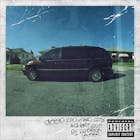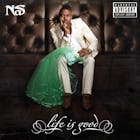
Classic Albums: 'My Beautiful Dark Twisted Fantasy' by Kanye West
Classic Albums: 'My Beautiful Dark Twisted Fantasy' by Kanye West
Published Thu, May 26, 2022 at 3:00 AM EDT
Kanye West IS the definition of a Black Beatle.
Kanye West became my favorite rapper the very moment I heard "Jesus Walks". My first iPod in 2008 was loaded up with all of Ye’s releases up until that point, including 808s and Heartbreak. I was a victim of the Shutter Shade trend prompted by the “Stronger” music video. Needless to say, Kanye West’s influence on me was undeniable from the beginning.
I’ll never forget the beginning of the My Dark Twisted Fantasy rollout. It was August 5; I was in an Orlando, Florida, hotel room on a family trip to Disney World, sitting in front of the television screen in full anticipation for MTV's exclusive premiere of Ye’s latest single, “Power.”
It was the Chicago artist’s first work released after his self-imposed exile to Oahu, Hawaii, following media crucifixion due to his controversial outburst at the 2009 MTV Video Music Awards, when the emcee intoxicatedly interrupted Taylor Swift’s Best Female Video acceptance speech.
Notoriously a polarizing public figure, Ye's return to the spotlight was expected to be monumental. And monumental it was. Premiering with a Marco Brambilla-directed music video, which West calls a “moving painting,” features a portrait-view headshot of West staring intensely into the lens with illuminated eyes while wearing a large, low-hanging gold chain with a pendant of Ancient Egypt god, Horus.
Portraying himself as a godlike figure, loved by many, hated by most, the 3D animated portrait shows Ye being showered by gifts; on the other hand, two-horned, staff-bearing men who resemble Isis and Hathor stand on either side of West; each slowly strikes the ground with their staff toward the end of the video.
The music video set the tone for what was to come with the release of Ye’s forthcoming project. The idea of power, influence, responsibility, faith, sin, and redemption are themes that run rampant in what would later become regarded as the Ye’s magnum opus. Lifting the curtains back, showing complete transparency, MBDTF was on its way to becoming a once-in-a-generation cultural phenomenon.
After the release of the “Power” music video, Ye began his weekly-free music program titled G.O.O.D. Fridays, where he released a series of unreleased tracks (some of which would appear on MBDTF) featuring long-time collaborators and other G.O.O.D. Music signees.
The first to kick off the series was the “Power (Remix)” featuring JAY- Z and Swizz Beatz. Ye kept the series running for 13-weeks before releasing the album, including singles, “Monster,” “Devil in a New Dress,” “So Appalled,” and a version of “The Joy,” which would later appear as a bonus track on JAY-Z and Ye’s collaboration album, Watch the Throne.
During the genesis of the internet era, Kanye’s digital marketing for the album was truly ahead of its time. Music executive veteran and online marketing coordinator Karen Civil called the series “a genius idea,” telling Billboard that “He did something no one had ever done before, and at a point when he was the most hated person in music, he brought excitement back with his Friday releases.”
With the hype continuing to build for Ye’s fifth studio album, expectations were high. After releasing his critically polarizing 808s and Heartbreak, fans had no idea what to expect. However, one thing was sure, Ye was continuing to break the barriers of genre and how Hip-Hop music was received and consumed.
At this point, it was apparent that Ye was dedicated to having his music received and appreciated as fine art. Living in Hawaii for over six months, Ye recruited some of music's most prolific artists to help craft the album, including Rihanna, JAY-Z, RZA, Rick Ross, Mike Dean, Elton John, Charlie Wilson, John Legend, Swizz Beats, Alicia Keys, Drake, and many more.
“I started the album on January 1st and just focused. I was down in Hawaii just grinding every day,” Ye told the Breakfast Club. “A song like’ Power’ took 5,000 hours, literally 5,000 man-hours to do this one record, and that’s the amount of time I put into every song.”
MBDTF’s legend status is cemented in the folklore stories regarding Ye’s creative process. The Chicago emcee laid out strict rules to keep the creative juices flowing, and every collaborator focused on what Kanye intended to be his masterpiece.
“I spent like two weeks out in Hawaii to work on the album,” RZA explained during an interview with Red Bull. “Looking at his regime, let me tell you something about [Kanye West], they wake up every morning and eat breakfast together, his whole crew. They plan what they want to do, what they did, and how to make the music better.”
DROP YOUR EMAIL
TO STAY IN THE KNOW


“Then they go exercise together, go to the YMCA and go play basketball, lift weights. Focus, go get their energy out, get their chi up, and focus… Then we go to the studio, for 12 hours then go to bed, get up, and do it again the next day.”
MBDTF captures the chaotic state of Kanye West’s psyche at this turbulent moment in his life. Subject to public ridicule for his controversial antics, still mourning the death of his mother, and breaking up with his then-girlfriend, Amber Rose, the aptly titled project takes listeners on a ride through a tormented soul.
Kanye West holds a magnifying glass on the way the public views and treats Black artists and public figures. In songs like “Power,” and “All of the Lights,” Ye reflects on the pressures of fame while simultaneously dealing with the everyday struggles of personal life.
“All of the Lights,” is a star-studded Hip-Hopera track, comparable to classic ballads like “Stairway to Heaven,” “Bohemian Rapsody,” and “We are the World,” as West takes on the role as an executive producer, recruiting additional vocalist including Rihanna, Charlie Wilson, Kid Cudi, Fergie, The-Dream, Elton John, Tony Williams, Drake, La Roux, Ken Lewis, Alicia Keys, and Alvin Fields.
The album was paired with a 35-minute short film, titled, Runaway, written by the legendary music video director Hype Williams and directed by Kanye West himself. Ye was inspired by films like Michal Jackson’s Thriller and Prince’s Purple Rain, further building on the themes and imagery of the songs on the album, and further expanding on the world-building behind the musical project.
MBDTF captures the chaotic state of Kanye West’s psyche at this moment in his life. Subject to public ridicule for his controversial antics, still mourning the death of his mother, and breaking up with his then-girlfriend, Amber Rose, the aptly titled project takes listeners on a ride through a tormented soul.
Kanye West holds magnifying glass on the way the public views and treats Black artists and public figures. In songs like “Power,” and “All of the Lights,” Ye reflects on the pressures of fame while simultaneously dealing with the everyday struggles of personal life.
“All of the Lights,” is a star-studded Hip-Hopera track, comparable to classic ballads like “Stairway to Heaven,” “Bohemian Rapsody,” or “We are the World,” with West taking on the role as an executive producer, recruiting additional vocalist including Rihanna, Charlie Wilson, Kid Cudi, Fergie, The-Dream, Elton John, Tony Williams, Drake, La Roux, Ken Lewis, Alicia Keys, and Alvin Fields.
The album was paired with a 35-minute short film, titled, Runaway, written by the legendary music video director Hype Williams and directed by Kanye West himself. Ye was inspired by films like Michal Jackson’s Thriller and Prince’s Purple Rain, further building on the themes and imagery of the songs on the album, and expanding on the world-building behind the musical project.

“I was mostly inspired by colors, like the palettes the colors, and technicolor all through it and just the emotion I wanted to put in. The main meaning of the film is to express yourself and not to let anyone tell you how to think.”
- Kanye West
The film further cemented Ye's position as a Hip-Hop fine artist rather than just a "rapper." On "Gorgeous," he raps, "What's a Black Beatle anyway, a fucking roach? I guess that's why they got me sitting here in fucking coach," addressing the trivialization of Black pioneers of music in popular culture. Ye was positive that MBDTF would cement his space as a generational talent, but would it clear him in the court of public opinion?






